Hume: Killing OMB a risk, but one city must take
February 7, 2012 17:02:00
Christopher Hume
Star Columnist
They say we should be careful what we wish for. To which we can add, nowhere more so than in Toronto.
If there weren’t enough going on last Monday, City Council voted quietly but overwhelmingly to ask Queen’s Park to exempt Toronto from the Ontario Municipal Board.
Secretive, even shadowy, the OMB is a 19th-century relic that has ultimate power over what gets built in the province. The quasi-judicial body is accountable to no one, and often behaves that way. Yet criticism that the board is a developers’ stooge doesn’t hold water. More often not, the OMB finds itself doing the dirty work for which our elected officials have little appetite.
So when councillors decided it’s time to cut the OMB loose, some were amused, others appalled.
The truth, of course, is that the OMB should have been abolished decades ago. By enabling politicians to duck the hard decisions, it has left civic politicians in an infantilized state. Toronto faces all the issues of a big city, but behaves like a small town, or more accurately; a series of small towns, each presided over by the ward boss through whose hands all development applications pass. Knowing full well the real action will unfold later at the OMB, councillors tells constituents — i.e. the NIMBY hordes — exactly what they want to hear.
With few exceptions — ex-councillors Anne Johnston and Kyle Rae come to mind — Toronto’s elected representatives prefer to toe the neighbourhood line than go head to head against their constituents. That’s understandable, but some things, including development, can be too important to be left to strictly local interests.
That’s why the development industry will fight tooth and nail against any such proposal. But the more they complain, the more they reveal their obvious indifference, even hostility, to doing what’s best for the city, let alone the neighbourhood. It doesn’t help that the nature of the condo industry — build cheaply, sell quickly — tends not to bring out a developer’s inner city-builder.
And with its courtlike processes, the OMB favours the rich over the poor, developer over resident. An army of planners, architects and various consultants makes a very comfortable living telling the board whatever the clients want it to hear. Professional opinions are infinitely malleable, the biggest determinant being the amount of cash on offer.
“The OMB is undemocratic and unelected” says downtown councillor Kristyn Wong-Tam, who led the charge against the OMB. “It has no sense of accountability. I’ve heard OMB adjudicators mispronounce names of streets and community centres. It shows me they have no sense of context. And yet a single adjudicator can undo years of community work and planning.”
At the same time, however, a single OMB judgment such as the one that kept Walmart out of Leslieville in 2009 can undo years of corporate effort and expenditure. Few tears were shed over that decision, but would council have had the strength to defy the world’s largest retailer?
The current council does not inspire confidence; the challenge would be to come up with an alterative appeal mechanism. Eliminating the OMB would also increase the opportunities for corruption; we could end up like those suburban jurisdictions where councillors do what developers tell them.
Provincial Municipal Affairs Minister Kathleen Wynne says she supports the move, but only as it affects “committee of adjustment matters.” That means small stuff — backyard decks and the like.
On the larger question of exempting Toronto entirely, she was less enthusiastic. That, she said, “requires consultations with all municipalities.”
chume@thestar.ca



